Aishwarya Tipnis outlines reviving everyday heritage in The Restoration Toolbox
by Almas SadiqueApr 29, 2025
•make your fridays matter with a well-read weekend
by Pooja Suresh HollannavarPublished on : Mar 09, 2024
Decarbonisation, digitisation, and deglobalisation have rapidly become more than buzzwords in the building and construction industry. They have become the driving forces behind creating a sustainable future. This is evidenced by the rise in investments in the construction industry towards structures that focus on decarbonisation, aid digitisation, and help deglobalisation. This primarily means building structures that are contextual and respond to their cultural and climatic settings. The recent G20 Summit and COP28 underscored the importance of global collaboration in addressing climate change, with India taking a leadership stance in showcasing its commitment to energy efficiency. The recent Forum on Energy Efficiency and Decarbonisation 2024(FEED 2024), held in Delhi, India, further built on this stance by rallying industry stakeholders, governments, and communities towards a cleaner and greener future.
FEED 2024 is an annual flagship event organised by the Alliance for an Energy Efficient Economy (AEEE). It serves as a pivotal platform for dialogue, discussion, collaboration, and networking. With over 1950 registrations, 920 companies, 210 speakers, 45 sessions, 15 sponsors, and 14 industry associations in its past editions, FEED has become the epicentre for discussions on clean technologies, collaboration, and sustainable solutions. This year the forum focused on, "achieving India’s energy efficiency commitment by 2030: Fuelling investments, creating green jobs, and forging key alliances" and placed a robust emphasis on decarbonisation, smart energy management, and knowledge transfer. Considering in India, buildings account for 30 per cent of our energy consumption, a large portion of the proceedings focussed on decarbonisation and energy efficiency in buildings.
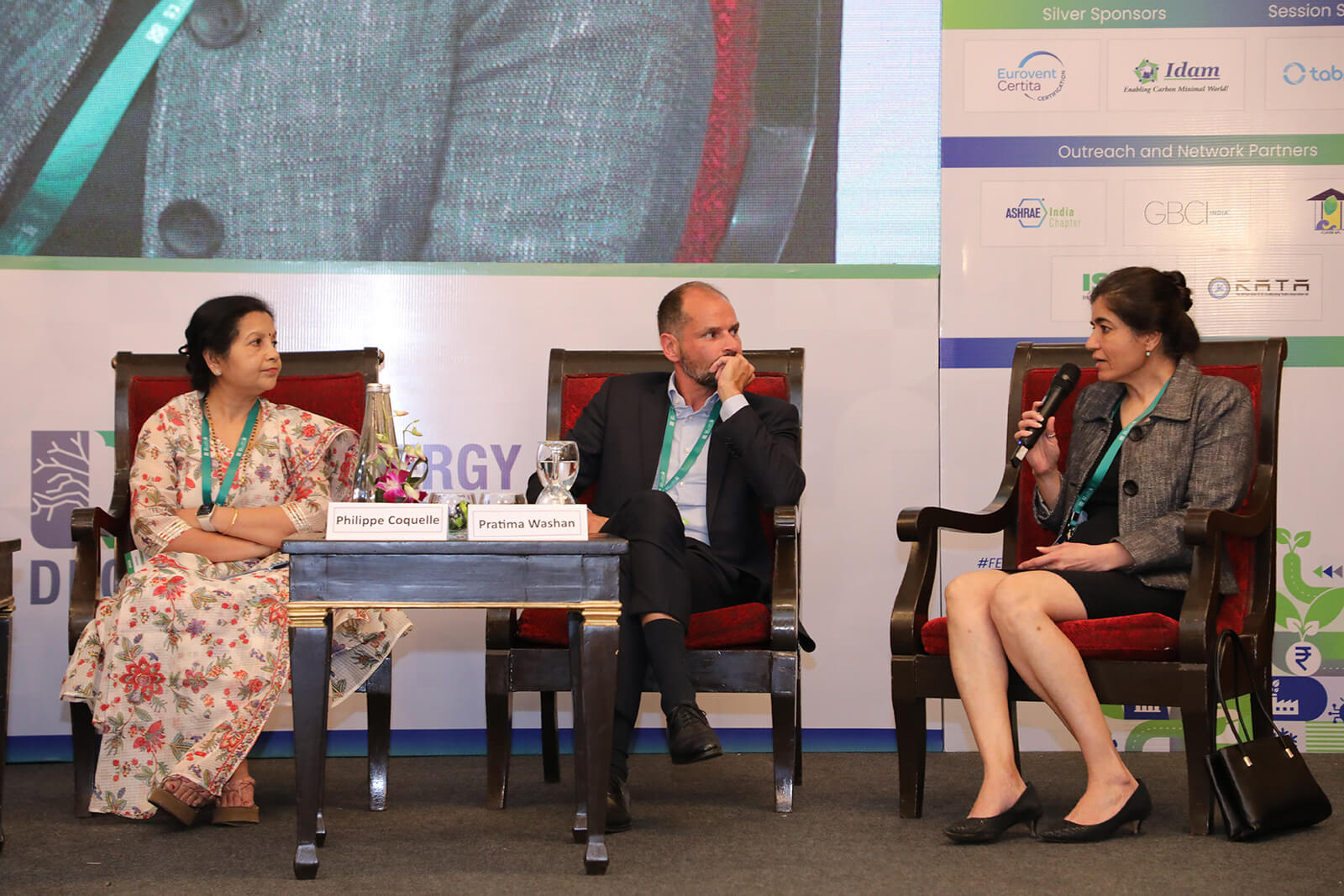
The many panel discussions and fireside chats over two days at FEED 2024 provided a deep dive into the complexities of decarbonising the building industry, a sector notorious for its operational carbon emissions. The panel discussion titled 'Decarbonisation of the Built Environment: Who Will Bell the Cat?' used the metaphor of 'belling the cat' to address the challenges hindering significant progress in decarbonisation. During the session, underscoring the pending growth of the building sector in India, Prasad Vaidya, Director of Solar Decathlon India said, “We have estimated that about 800 million square meters will grow every year which is going to result in added emissions of about two gigatons.” This set the context for the rest of the discussion that raised issues around supply and demand dynamics, operating costs, risks, lack of business recognition for academic achievements, and the absence of transparency and collaboration leading to oversized projects or poor-performing assets.
In the residential sector, conflicting requirements often hinder energy efficiency efforts. Builders, seeking incentives for constructing green buildings, face a dilemma between environmental concerns and economic interests. This tug-of-war impedes progress, and FEED 2024 provided a platform for stakeholders to discuss solutions.
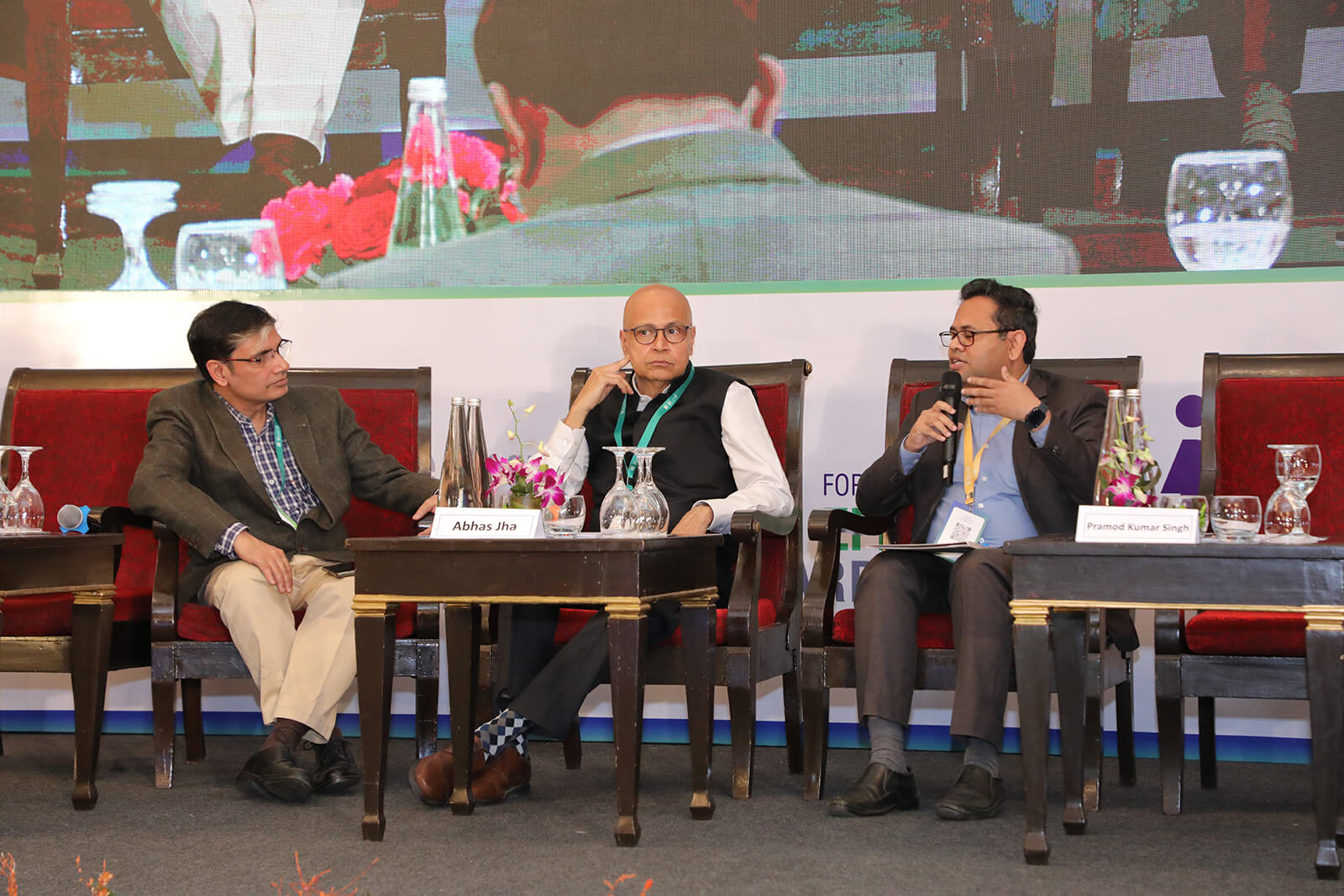
The fireside chat titled Opportunity Meets Planning: Solutions for India delved into the intricacies of urban planning, design, and construction. Experts stressed the need for a holistic approach, incorporating technological innovation and behavioural change interventions to foster demand flexibility. The discussion emphasised the significance of thoroughly monitoring heat dynamics to inform urban planning decisions. The chat also highlighted the need for resilient buildings that protect lives and livelihoods in the age of increased frequency of natural disasters caused by climate change.
The session titled 'Money Matters: Policy and Market Reforms to Scale Up Energy Efficiency Financing in India' addressed the financial challenges in energy efficiency projects. The relationship between the built environment and energy efficiency was further emphasised by Bradford H Dockser, Chief Executive Office and Co-founder of Green Generation, as he talked about decarbonisation in new construction as well as retrofitted buildings. He said, “With all the new construction underway in India, embodied carbon has to be a part of the conversation.” His co-panellists—Dhruba Purkayastha (India Director, CPI), Parag Sharma (Founder and CEO, O2 Power) and Saurabh Suneja (Director, National Investment and Infrastructure Fund)—stressed the importance of tailoring strategies to specific market dynamics, advocating for standardised frameworks, including consistent business models and bidding processes. Incorporating Measurement and Verification (M&V) processes was highlighted as crucial for attracting institutional investors and ensuring the profitability of energy efficiency projects.
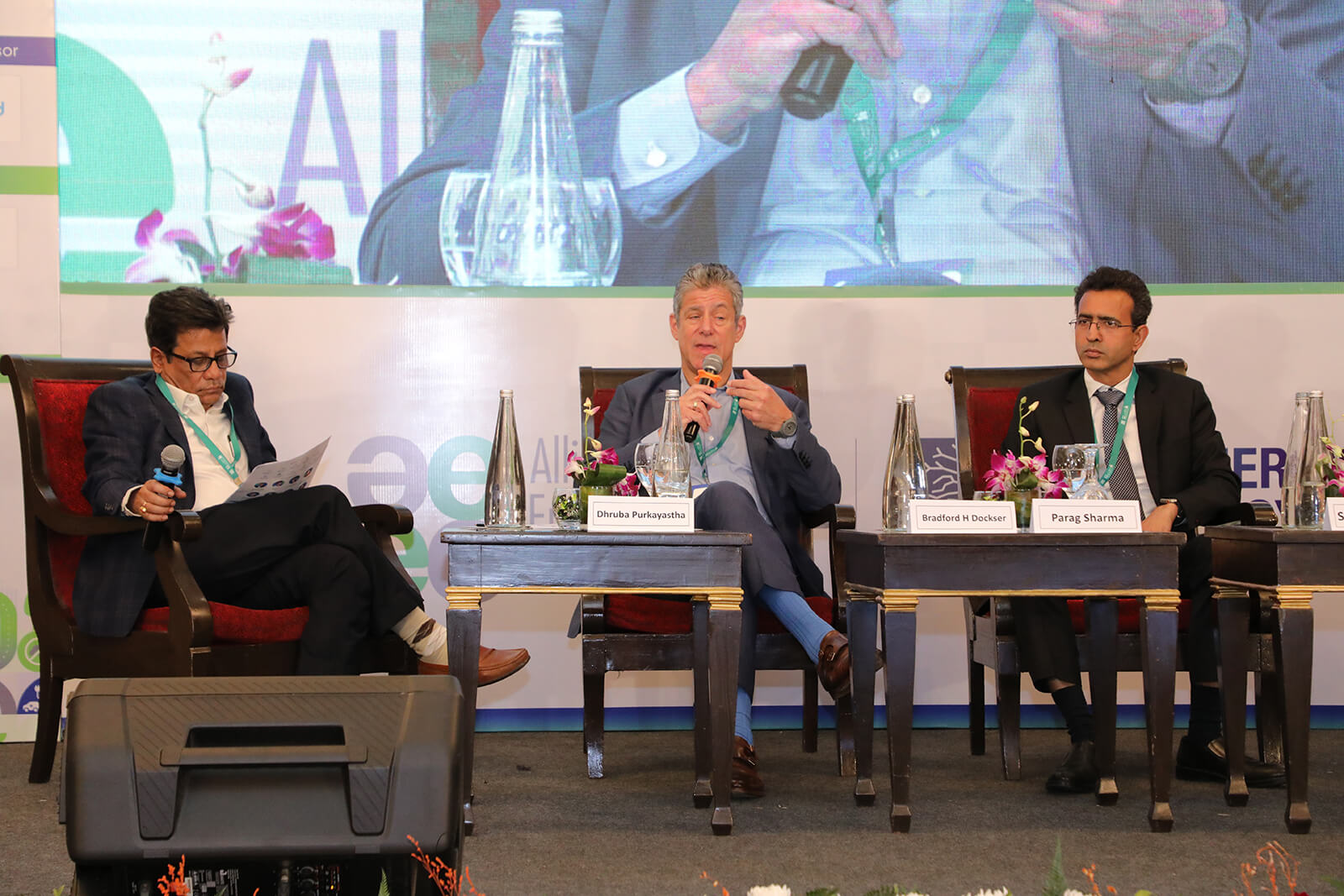
The session, 'People-centric Progress: Democratising our Energy Future' delved into encouraging energy efficiency choices through technology and data-driven initiatives. It also stressed the importance of actively pursuing diversity and inclusivity to create a more equitable future. All the panellists stressed the importance of behavioural science and AI interventions to influence customer actions towards energy efficiency. Parveen Dhamija, Advisor - Skill Council for Green Jobs in particular said, “We have to transition to clean and efficient energy, and we have to have a lot of community engagement.” The panellists also highlighted the importance of transforming the education sector to match the demands of a changing professional sector in the world of energy efficiency. The discussion highlighted the current gap in the sector's training modules, advocating for inclusivity, and diversity in rural India.
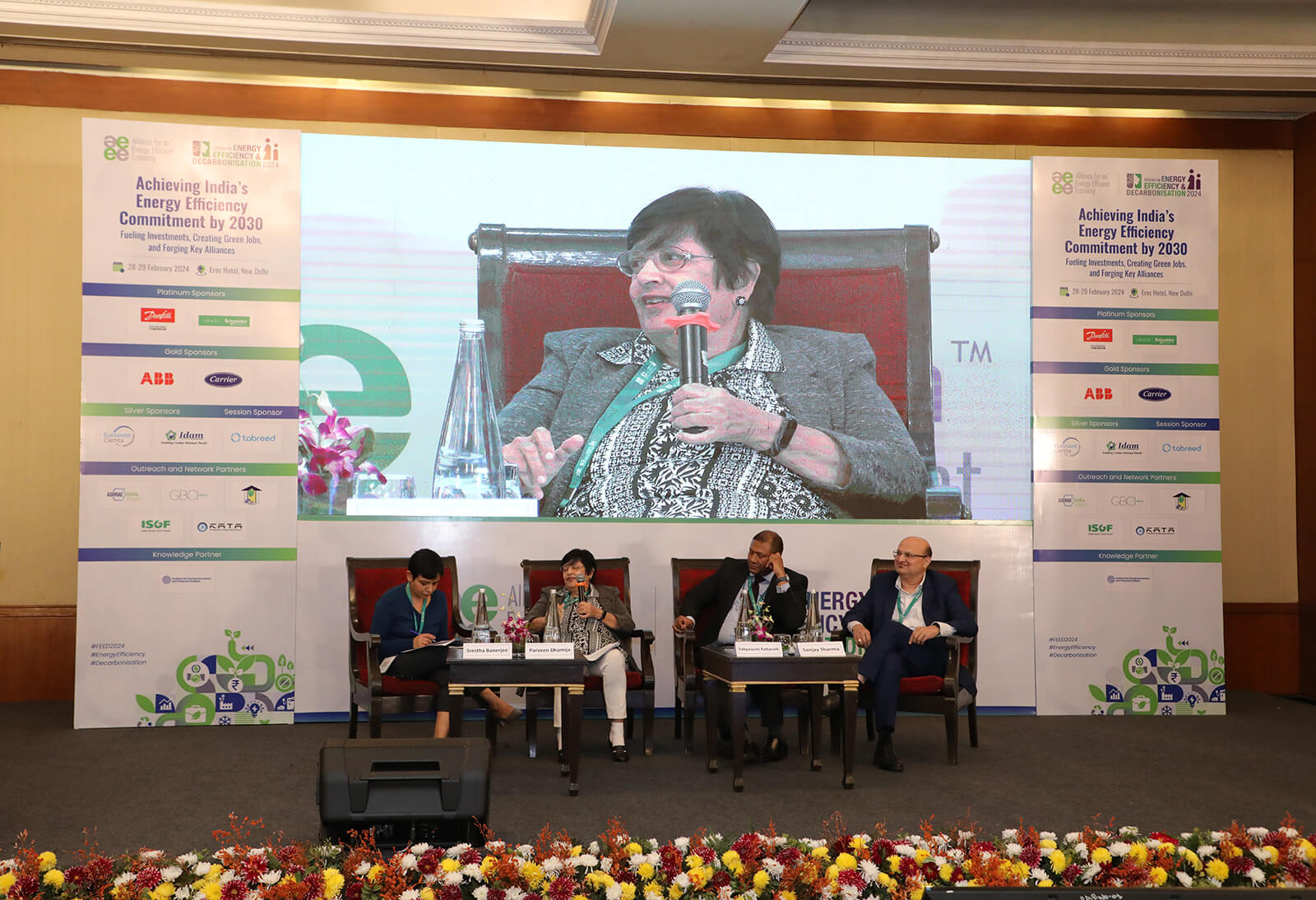
The panel discussion on Net-Zero India: Building the momentum with Solar Decathlon India highlighted the importance of transitioning focus from technological readiness to market readiness and social acceptability for impactful scaling of solutions. The session started with a presentation of projects by past participants of Solar Decathlon India, the world’s largest net-zero building challenge. The presenting teams showed that net-zero buildings can also be attractive and affordable. Together they showed why we must invest in this next generation of net-zero leaders. This was followed by a panel discussion that tackled questions related to policy and industry trends aimed at buildings’ decarbonisation for 2030 and how these trends could be served through initiatives such as Solar Decathlon India. In addition to appreciating the work done by students through the competition, the panellists recommended promoting interdisciplinary education to address climate, social, and economic challenges, emphasising the need for design and operations improvements, particularly in sectors like healthcare.
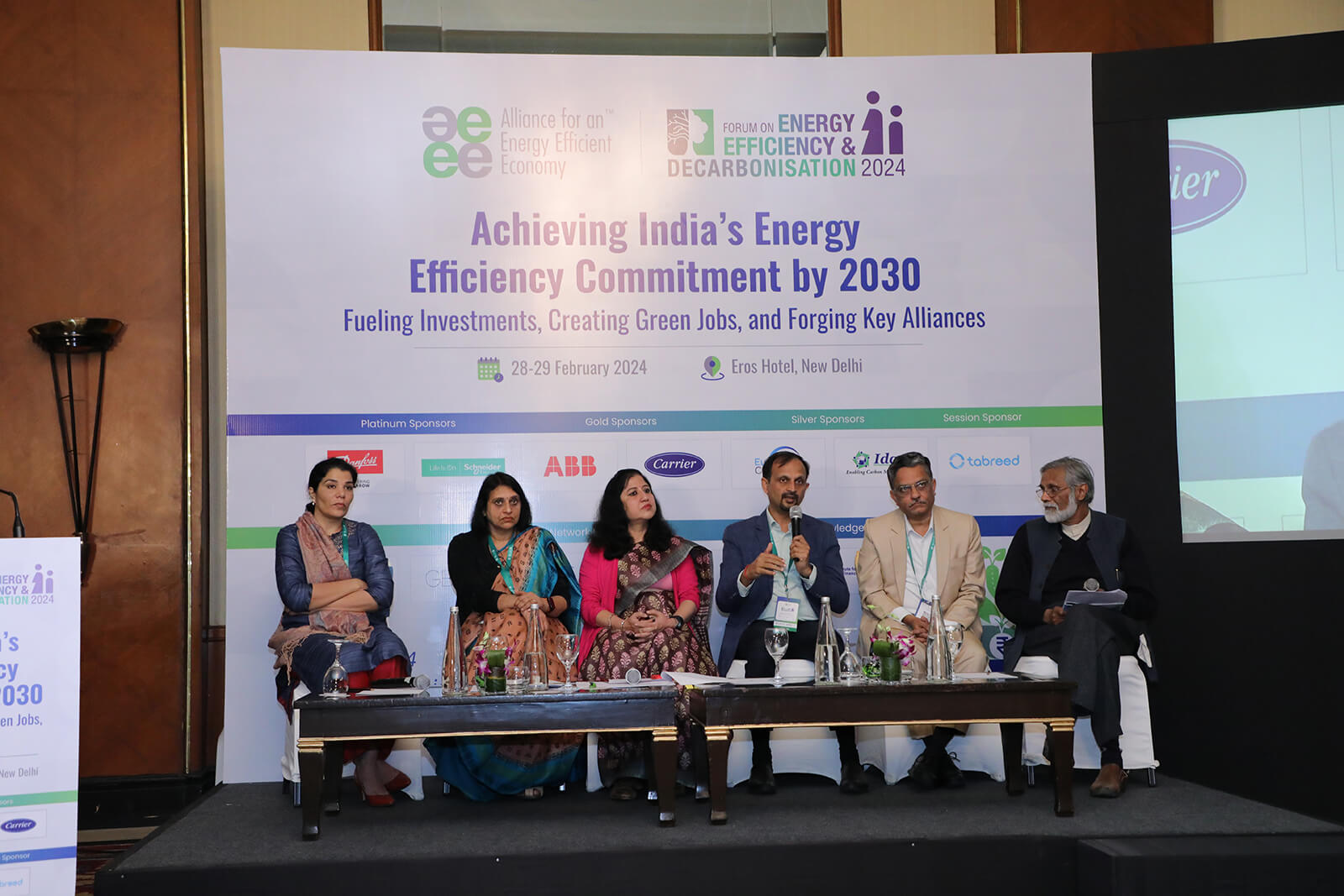
Over the two packed days of presentations, fireside chats, and panel discussions, FEED 2024 showcased India's commitment to a cleaner and greener future. Held on February 28-29, 2024, in New Delhi, the event provided a platform for meaningful dialogue, collaboration, and knowledge sharing. As the building industry grapples with the challenges of decarbonisation, FEED 2024 play the role of enabling open discussion to pave the way for a more sustainable and energy-efficient future.
by Mrinmayee Bhoot Oct 10, 2025
Earmarking the Biennale's culmination, STIR speaks to the team behind this year’s British Pavilion, notably a collaboration with Kenya, seeking to probe contentious colonial legacies.
by Sunena V Maju Oct 09, 2025
Under the artistic direction of Florencia Rodriguez, the sixth edition of the biennial reexamines the role of architecture in turbulent times, as both medium and metaphor.
by Jerry Elengical Oct 08, 2025
An exhibition about a demolished Metabolist icon examines how the relationship between design and lived experience can influence readings of present architectural fragments.
by Anushka Sharma Oct 06, 2025
An exploration of how historic wisdom can enrich contemporary living, the Chinese designer transforms a former Suzhou courtyard into a poetic retreat.
 surprise me!
surprise me!
make your fridays matter
SUBSCRIBEEnter your details to sign in
Don’t have an account?
Sign upOr you can sign in with
a single account for all
STIR platforms
All your bookmarks will be available across all your devices.
Stay STIRred
Already have an account?
Sign inOr you can sign up with
Tap on things that interests you.
Select the Conversation Category you would like to watch
Please enter your details and click submit.
Enter the 6-digit code sent at
Verification link sent to check your inbox or spam folder to complete sign up process



by Pooja Suresh Hollannavar | Published on : Mar 09, 2024
What do you think?